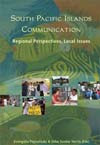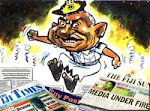 Kia ora koutou katoa
Kia ora koutou katoaI apologise for not being present at the PMC workshop but have been in Wellington for my address, last night at Te Papa and research today at the NZ Film Archive.
I am very pleased to be carrying out a research project under the auspices of the Pacific Media Centre/CIRI/AUT and wish to acknowledge the invaluable encouragement and support of Drs David Robie and Geraldene Peters in bringing
this about.
The Ngatihine Land/Forestry dispute of the mid-late 1970s saw a confrontation between two groups on a very uneven playing field. The imposing power of state judicial and bureaucratic agencies allied with big business was ranged against a very scattered and disorganised group of Maori landowners in the contest for control over 5514 hectares of Maori land in Northland.
Yet, against all the odds, the Maori shareholders concerned succeeded in parrying this attempt at sequestrating their property rights. The research proposal involves utilising documentary records to show how this issue was played out in the media and what effect this might have had on the final outcome.
The material at the my disposal comprises original press releases, numerous newspaper clippings, one TV2 News item transcript and a set of telephone logs kept continuously by the writer between April 1977 and May 1982 (with an additional period May-December 1983)
An adjunct to this resource will be documents kept by my late uncle, Graham Alexander, which may contain further material and the video documentation of aspects of this dispute made by the videomaker Darcy Lange, with whom I collaborated at the time.
A journey will be made to the locality of the forestry block in the mid-North where I will update my photographic record of it and visit surviving participants and record their recollections of events.
A report will be produced drawing all this material together and as the project proceeds, thought will be given to the output platform but it will be a combination of hard copy and electronic methods.
The Ngatihine legal dispute has a significant place in Maori land law but over the last 30 years has become a forgotten event. It would be valuable or both the younger generation of landowners and for scholars and others interested in this field to have some clear documentation of this period – just to show that a disadvantaged group can utilse the media to achieve a
positive outcome, for it. It will be of particular interest (and hopefully use) to the present Ngati-Hine Forestry Trust (these days, a very successful enterprise) whose own website contains no documentation relating to its
genesis.
Kia ora ano
John Miller
Photojournalist
Auckland






















